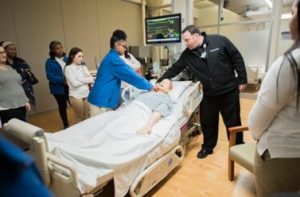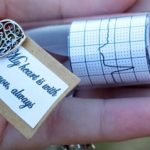Nursing Shortage: Can Rutgers Be Part of the Solution?
 Amid a crippling nursing shortage, thousands of potential nursing candidates are turned away each year from training programs throughout New Jersey.
Amid a crippling nursing shortage, thousands of potential nursing candidates are turned away each year from training programs throughout New Jersey.
The COVID-19 pandemic has exacerbated the shortage — with nurses quitting or retiring in droves — but that’s only part of the problem. Another major issue is finding the capacity to educate the sheer number of nursing school candidates who apply each year.
In 2022 alone, Rutgers University’s School of Nursing turned away more than 1,000 would-be students simply because there wasn’t enough faculty or clinical sites available to train them.
Yet new recruits are desperately needed throughout the state and the nation.
“Schools of nursing across the United States just don’t have the capacity to increase their enrollment,” said Linda Flynn, dean of the Rutgers School of Nursing.
In fact, the American Association of Colleges of Nursing estimates almost 92,000 qualified nursing school applicants were turned away in 2021.
“These were students that wanted to become registered nurses,” Flynn said.
Rutgers University — home to the state’s largest nursing program — is hoping to address at least part of the problem. It received a nearly $1 million federal grant earmarked for simulated clinical training, which could loosen the bottleneck and allow the school to boost admissions.
“The reason we turned them away, as do other schools in New Jersey — and there are thousands that are turned away in the state — is three things, and it’s three things that are similar in schools of nursing across the country: lack of space, lack of faculty, or lack of clinical placements, or all three,” Flynn said.
For Rutgers, space and faculty are less of an issue than finding clinical training sites that can accommodate its students, she noted.
The $950,650 grant — from the U.S. Department of Health and Human Services’ Health Resources and Services Administration — would expand simulated training, utilizing more high-fidelity mannequins, which are expensive (around $125,000 apiece), but critical to addressing the problem, according to Flynn.
Rutgers’ School of Nursing produces about 300 graduates every year. To graduate, students must complete a residency program, which involves visiting various New Jersey hospitals to receive on-site training. But hospitals are at capacity.
“We have saturated the state with our students, and we put a huge burden on our hospitals,” Flynn said.
Simulated training wouldn’t resolve the problem entirely. But it’s a start, she said.
“With the money for simulation, we don’t have to overburden our current hospital partners. We can expand our enrollment by about 75 students in the fall, or 25% of what we usually (admit),” Flynn said.
The mannequins wouldn’t entirely replace on-site training, but substitute roughly 30% of students’ clinical rotation hours, according to a statement from Rutgers. However, Flynn noted simulated training is just as good as the education received in hospitals.
“Clinical simulation has been used now for a good decade with really good results,” she said. “And studies have shown that if you — instead of sending the students into hospitals with real patients for all of their hours — if you give 30% to 50% of those hours to clinical simulation, the student learning outcomes are just as good, if not superior.”
Again, the mannequins are not a panacea, but could ease the bottleneck. She hopes additional funding can be acquired.
“This is the beginning,” Flynn said, “and hopefully, we’ll be able to secure additional funding from somewhere to purchase more. And as we do, we could even bump that up to 40%, for example.”
Experts predict the nursing shortage will worsen in the coming years, with around 10,000 nurses in the state expected to leave the field, whether due to retirement or finding other employment, according to the New Jersey Collaborating Center for Nursing.
But students are still enrolling. According to Flynn, the industry needs to find ways to accommodate them.
(This story originally appeared in NJ.com.)




